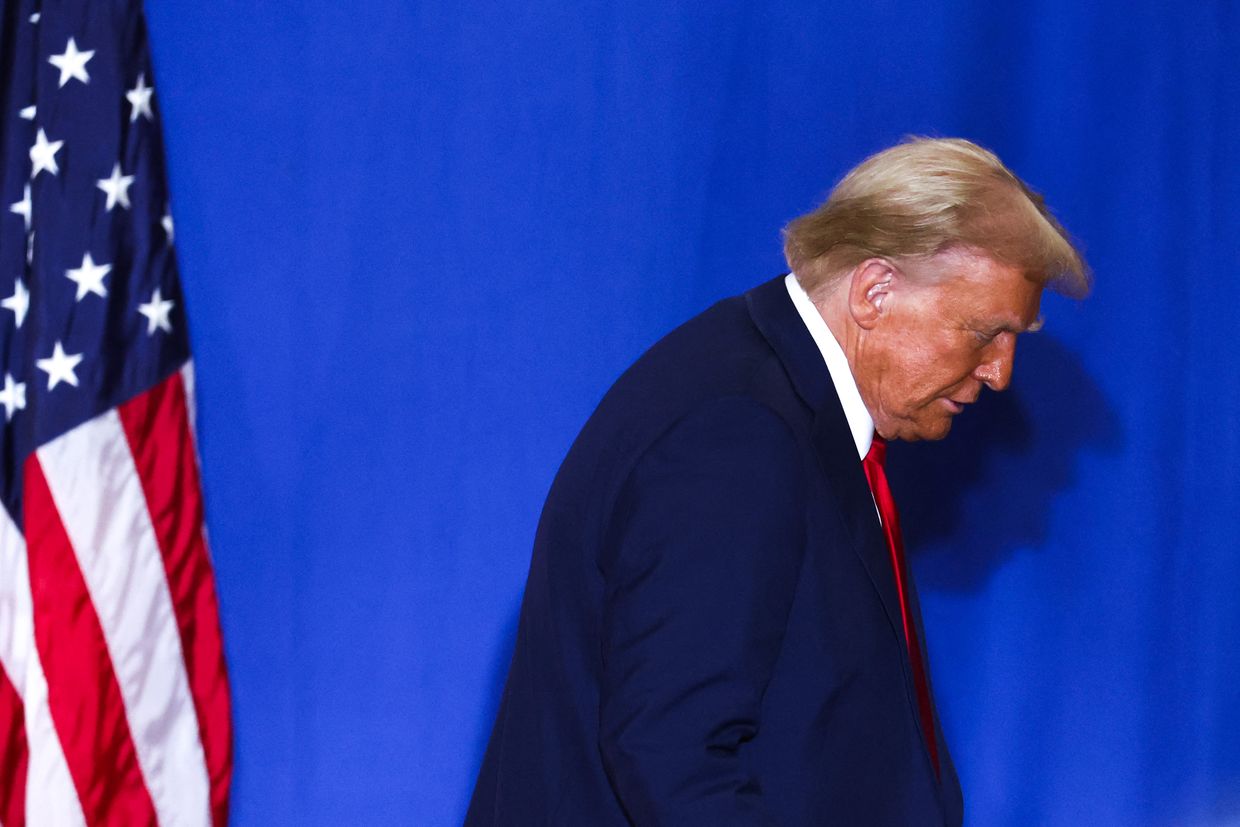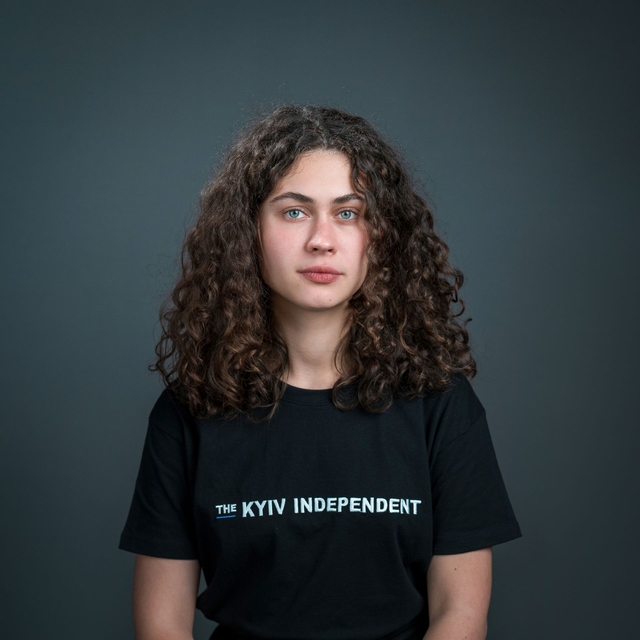'US tells Russia crimes it commits are acceptable' — What recognition of Russia's occupation of Crimea would mean for Ukrainians, Crimean Tatars

The Crimean Tatar flag flies outside the Kyiv City State Administration building on Crimean Tatar Flag Day, on June 26, 2023. (Kirill Chubotin/Ukrinform/Future Publishing via Getty Images)
The U.S. is reportedly considering officially recognizing Russian control over occupied Crimea as part of a potential peace agreement — a territorial concession that would kill the existing world order and is deemed unacceptable by Ukraine.
According to Axios, the Trump administration's final proposal for ending Russia's all-out war against Ukraine included U.S. de jure recognition of Moscow's control over Crimea, along with de facto recognition of its partial occupation of other Ukrainian regions — Luhansk, Donetsk, Kherson, and Zaporizhzhia.
U.S. President Donald Trump said on April 23 that Washington is not forcing Ukraine to recognize Crimea as Russian. He then followed by accusing Ukraine of not fighting for the peninsula Russia occupies.
"Nobody is asking (President Volodymyr) Zelensky to recognize Crimea as Russian territory, but if he wants Crimea, why didn't they fight for it 11 years ago when it was handed over to Russia without a shot being fired?" Trump wrote on Truth Social.
Russia's war against Ukraine began in Crimea in 2014. Since then, Moscow has been actively reshaping the peninsula's ethnic composition, bringing nearly a million Russians into the occupied area and forcing Ukrainians and Crimean Tatars, indigenous people of the peninsula, out and persecuting those who stayed.
The peninsula was turned into a military base, and in 2022, Russia used occupied Crimea as a staging ground for its full-scale invasion of Ukraine.
The possible U.S. recognition of Russian control over the occupied peninsula would mark an unprecedented step, effectively allowing Moscow to avoid accountability and signal that borders are to be redrawn by force.
For many Ukrainians and Crimean Tatars it would mean, in turn, that they would never be able to return home.
The Kyiv Independent asked Ukrainians and Crimean Tatars to share their stories about Crimea and what would it mean for them if the U.S. would acknowledge and support Russia's annexation of their homeland.
Alim Aliev, 36, Ukrainian human rights activist, journalist, founder of the Crimean Fig project
For me, Crimea is not just a territory. It is not the sea, mountains, beautiful landscapes, or delicious food. Above all, Crimea is my home. And I haven't been home for 11 years. My entire childhood was spent in Crimea — my earliest memories, my first victories, my first defeats — all of it happened there. Crimea is what shaped me.
This won't change much for me personally. Because for me, Crimea remains clearly under occupation, where my people — Crimean Tatars and Ukrainian activists — are constantly and systematically repressed. And it's a place I simply cannot return to right now. People like me are labeled as 'extremists,' 'terrorists,' and so on.
That's why, over the past 11 years, there has been and still is continuous resistance on the peninsula. But beyond that, many Crimean residents, Crimean Tatars, are serving in various units of Ukraine's Armed Forces, united by a single goal — to return home.
Crimean Tatar artist, 32, whose family remains on the peninsula
(Anonymous for security reasons)
Recognizing the occupation as legitimate is a turning point.
A precedent where force overshadows law. It is a tacit agreement that you can just come and take what is not yours.
A world in which the door opens for those who redraw borders by force, and borders become temporary agreements. Where silence is interpreted as agreement.
This is not just about Crimea. This is about everyone. Legitimizing the seizure is legalizing lawlessness. And from this moment on, chaos is no longer an anomaly — it is the norm.

A resident based in occupied Crimea, 38
(Anonymous for security reasons)
I regard all his (Trump's) statements as empty chatter now. He plays on the news and loud statements, that's all, so I don't take any such news seriously at all.
Lia Gazı, 23, Crimean Tatar activist in exile
I was born in Crimea, and only now do I truly understand what a privilege that was. Generations of my family fought for the right to live on their native land, enduring exile, surviving the harsh return from Uzbekistan (following the Soviet deportation of Crimean Tatars from Crimea), and rebuilding their lives from scratch… all so that I could be born in Crimea.
I spent the happiest years of my childhood there. That precious time came to an abrupt end with the Russian occupation. For us, Crimea is not just a seaside or a vacation spot. It is our homeland, the one place where we truly belong, where every hill, every street, every scent holds a memory.
One of my warmest memories is of the days when our relatives from Uzbekistan came to visit their homeland. We used to travel often, and only now do I realize that I may never again see the Khan's Palace in Bakhchisarai the way I remember it from my childhood, because Russia is destroying it. One of the most important symbols of Crimean Tatar history is being erased before our eyes.
As a Crimean Tatar, as someone whose homeland is Crimea, whose ancestors lived and died on that land, the very thought of the U.S. recognizing Russia's occupation is devastating. I am the fifth generation of my family that has not been able to live freely in Crimea. To me, such recognition would feel like a personal betrayal. It would mean that the hope I've carried in my heart all these years, the hope of returning home, is slowly being extinguished.
I have lived in exile believing that one day, justice would prevail and Crimea would be free again. But now, the idea that powerful nations are even considering legitimizing this occupation fills me with profound disappointment, sorrow, and a sense of abandonment.
From the very beginning, the international response to the occupation of Crimea has been too weak. But never did I imagine that we would reach a point where the discussion would shift from how to liberate Crimea to how to normalize its annexation.
For Crimean Tatars, this would be more than just a political decision, it would be a death sentence for our national identity. It would signal to the world that the disappearance of our people, our language, our culture, and our history is acceptable.
The world's acceptance of Russia's control over Crimea would mean accepting that the Crimean Tatars, the indigenous people of the peninsula, may cease to exist as a distinct nation.

Kyiv-based student, 21, whose family remains on the peninsula
(Anonymous for security reasons)
"Crimea was the place where my brother and I spent our childhood. We lived there from time to time and, received treatment, and then returned to the mainland. The memories are warm: figs in our own garden, Karaite family friends, hikes in the mountains to the old Krymchak cemeteries. Throughout our childhood, we were prepared for the idea that we would study and live there, and in 2013, we planned to move there permanently.
The legitimization of Russia's occupation by the U.S. is perceived in the same way as much of what we are hearing from Trump and his team: quite absurd but also scary because it could be done. If the United States decides to take such a step, other countries that are politically and economically dependent on it may follow.
There are indeed pro-Ukrainian residents in Crimea who believe that Ukraine will return.
Tamila Tasheva, 39, Ukrainian lawmaker, president's former permanent representative for Crimea
Crimea is not just geography, it is not just a territory. It is the place where my family comes from, the place that holds the history of my people. It is the place where my identity was shaped and where my civic activism began. Because of the 1944 deportation, I was born in Samarkand, Uzbekistan, but Crimea has always remained in my heart as a point of return and deep connection.
My personal memories of Crimea include warm evenings there and stories of the 1944 deportation experienced by my loved ones. It also includes the first public demonstrations in support of Crimeans and Ukraine in Crimea, as well as the first impactful civic initiatives.
Since the occupation of Crimea, I have not been able to return home for over 11 years. Sadly, I am not alone. Many Ukrainian citizens, activists, and representatives of the Crimean Tatar people are, for various reasons, barred from returning home. Yet, despite this, Crimea remains a point of internal connection, hope, and resistance.
The idea of possible U.S. recognition of Russia's occupation of Crimea is absolutely unacceptable. Legally, it contradicts Ukraine's Constitution, which clearly defines Crimea as part of our sovereign territory. Politically, it would mean surrendering to evil and legitimizing the results of illegal, unprovoked aggression. And personally, it would be yet another attempt to erase my identity, my family's history, and the struggle of thousands who have fought — and continue to fight — for a free Crimea.
For Crimeans, such a stance is not just a betrayal. It signals that their pain, repression, deportations, arrests, and humiliation supposedly do not matter. It would imply that those who resisted the occupation, who refused to collaborate with the occupiers, who ended up imprisoned — did it all for nothing. But that is not true. It is precisely because of them that Crimea remains Ukrainian — politically, culturally, in the hearts of millions.
Ukraine does not trade its people nor its land. Crimea cannot be a 'bargaining chip.' Anyone who thinks that recognizing Crimea as Russian would end the war is gravely mistaken. It would create a precedent that aggression and occupation are acceptable. Ukraine will not allow that.
Liza Sivets, 31, working in the public history field
I was very lucky to be born in Crimea and live there for 20 years, until 2014, so all my childhood and carefree youth are associated with the peninsula. I grew up by the sea, in a place with the most beautiful sunsets. I traveled all over Crimea with my family, school travel group, and university friends. This region is extremely rich in history, including tragic and little-talked-about history, and this influenced what I chose to do as my work.
But Crimea is not just memories for me. These are people whom Russia imprisoned or forced to leave their homes because of their beliefs. These are the people who still live there, under occupation and propaganda, and force themselves to remain silent so that this Russian repressive machine does not hit their families as well.

I see it as a defeat of American democracy and a confirmation that the U.S. is aligning itself with Russia. Overall, I am disappointed but not surprised. If this recognition happens, me and other residents of Crimea will feel even more betrayed and hopeless.
Thousands of internally displaced people and refugees are unlikely to be able to return home, see their loved ones, or visit their family graves. And people in Crimea, who are waiting for justice and Ukraine's return, will suffer even more repression from Russia.
In fact, by this recognition, the United States is telling Russia that the crimes it commits are acceptable, that it will not be punished, and that it can continue. If Trump is so eager to please (Vladimir) Putin, he might as well hand over one of the American states to Russia.
Khrystyna Burdym, 35, culture and art worker, the Crimea exhibition curator
Unfortunately, my memories are still very childish. The last time I was in Crimea was when I was about 10 years old.
For me, Crimea is, first and foremost, an image of carefree days. I associate it with nature, with my family, with the people with whom we traveled there on vacation, and with friends who lived on the peninsula before it was occupied.
Crimea is also about health, Crimean Tatar cuisine, and happy parents.
Unfortunately, at the time, I didn't fully grasp the depth, uniqueness, and significance of the peninsula. I knew far less about it than I would have liked — its history, culture, and the Crimean Tatars. It was still the 2000s, and back then, Crimea wasn't as visible or widely discussed as it is today.

But thanks to the exhibition we organized for the Crimean Platform, it felt like I returned those memories, while also hearing an incredible number of stories from artists, from those who were born in Crimea.
This statement (about the U.S.'s possible recognition of Russian control over Crimea) has been in the air for a long time. But until recently, I hoped that a country with such influence and weight would not say it out loud.
Of course, such things are unsettling. They are troubling. But I hope that for Ukrainians, as well as for everyone who supports us around the world, this will be nothing more than a temporary shock after which we will return to the fight even more resolutely.
Putting aside geopolitics, what hurts me the most right now is what's happening with my friends, those who are from Crimea. They have been unable to return home since 2014. Some of them have not seen their families for years. This is unfair. It is painful.
And I want to make it clear once again: this occupation is temporary. I believe in it. As I think most Ukrainians do. And many people in the world do, too.
Crimean Tatar artist, 40
(Anonymous for security reasons)
Me and my family in Crimea have a negative attitude toward Trump's potential recognition of Crimea as Russian. It's not even a topic of discussion in my family circles. For them, it's unacceptable when people say that Crimea will never return to Ukraine.
If Crimea becomes Russian, I can only imagine the repression and added pressure that would fall on those with a Crimean Tatar identity or views that are not tolerant of Russia.
There's also a specific problem for representatives of the Crimean Tatar community who have to hide their names because it poses a threat to their relatives in Crimea. Even soldiers fighting for Ukraine, when they are buried, are not always publicly named. For us, anything that requires publicity is restricted.
A close relative of mine, a retiree (from Crimea), said: 'That's impossible, they won't recognize it — the people of Ukraine do not support this. Sooner or later, Crimea will return to Ukraine.'













